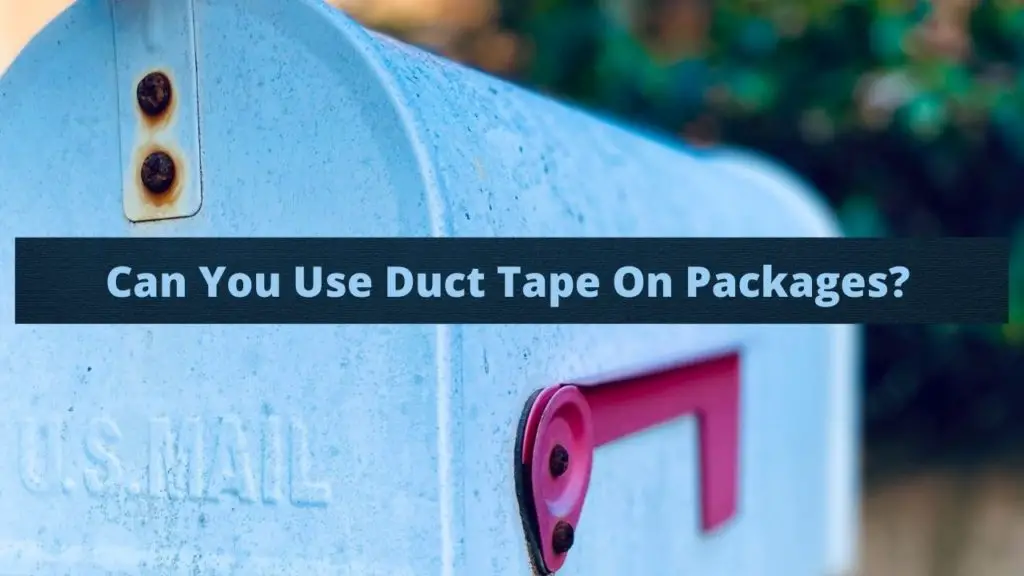If you’re getting a package ready to send, you might be wondering whether you can use duct tape to hold the package together. Do mailing companies accept duct tape?
You shouldn’t use duct tape on any packages or envelopes, because it does not adhere well to packages, and they are at risk of spilling open. Most shipping companies will refuse to ship parcels that have been sealed using duct tape. You must use proper packing tape. All post offices have the packing tape you can use, but they will most likely charge you for that.
Today we will explain all the details when it comes to choosing the material for packing your parcel in the best and safest way.

Can You Use Duct Tape On USPS/UPS/FedEx Packages?
No, you cannot use duct tape to ship packages with any of the above companies. USPS, UPS, and FedEx will all reject packages that have been sealed or reinforced using duct tape.
Occasionally, a package with duct tape may slip through and get accepted, but it should not be. All of these companies state in their packaging guidelines that they do not accept packages that have duct tape on them. Do not try and ship a package with duct tape, because it will probably be rejected.
Why Isn’t Duct Tape Allowed For Packaging?
Duct tape is often thought of as a very strong kind of tape, but it is not designed to adhere to cardboard. It was made to stick firmly to itself, creating a very strong seal around ducts – hence the name.
However, when you try to stick it to cardboard, you will find that it pulls off easily. It will not adhere well to any paper-based products, because it was designed to stick to itself. A package that has been sealed with duct tape is very liable to come open, and then the contents will be lost.
Temperature changes also affect duct tape, making it more likely to peel away from the cardboard while it is being shipped. This is true even if it seems secure in your living room.
The shipping companies are aware of these issues and have banned duct tape because they do not want to be dealing with angry customers who keep losing their mail.
They also do not want their machines to be clogged or damaged by items falling out of the mailed boxes, or their workers to spend hours re-packaging items that were not properly packed.
Duct tape causes too many issues for the shipping companies to be allowed.
What Kind Of Tape Does USPS/UPS/FedEx Accept?
You can use several other kinds of tape while meeting the guidelines provided by the shipping companies. Try using:
- Packing tape (clear or brown are both fine)
- Reinforced packing tape (for heavier items)
- Paper tape (more environmentally friendly and looks rustic)
These tapes are much better at coping with the “dusty” surface that cardboard has. Because cardboard is fibrous, many tapes will peel straight off it, taking a layer of the fibers with them.
This is particularly true in dusty or slightly damp conditions, which your package may be exposed to as it is shipped.
What Kinds Of Tape Are Best For Shipping?
- Packing tape
The best kind of tape for shipping is brown packing tape. This has been designed specifically to adhere to cardboard boxes and cope well with the temperature and moisture fluctuations of being shipped.
- Reinforced packing tape
You may want to choose one of the high-quality, branded tapes if you are shipping large items that will put your packaging under stress. This is still packing tape, but it is more robust. 3M is a brand that is known for its quality, but you will pay more for it than for off-brand options.
- Paper tape
Packages can also be shipped using strong paper tape, but make sure that it does not peel off if it gets wet. Some paper tapes are activated by water and may fall off the parcel if they are exposed to damp conditions.
Does A Post Office Have The Tape I Can Use? Is It Free?
It may vary by location, but most local post offices will have suitable tape that you can use to pack your parcel. However, this tape is not free; you will be charged to use it.
USPS does offer some free packing materials, but the tape is not given away to customers.
If you wish to take a roll of tape home, you will need to purchase it. In general, boxes and envelopes are given away, but other supplies such as tape and bubble wrap must be bought.
Sometimes, a shipping clerk will loan you their roll of tape to add a small amount to your parcel if you realize there is a loose edge, or you have forgotten to put clear tape over the address label.
However, this is totally at the discretion of the clerk, and you should not depend upon it. If you need tape, you will have to purchase it.
Can You Use Scotch Tape On Packages?
No, you cannot use what most people call Scotch tape on your packages. It is worth noting that the Scotch brand does make tape for packages, but you must specifically buy their shipping tape for this.
Standard Scotch tape was designed for light use, and it is not robust enough to stick a package together with. It will simply peel off or rip away while the package is being shipped. Even a small, light package should not be shipped using Scotch tape.
It is not even recommended that you use Scotch tape to secure the label of your package, because it simply is not strong enough. Use proper packing tape for your parcel and clear packing tape for your address label.
Can I Ship Two Boxes Taped Together?
USPS will accept two boxes taped together for shipping if they are approximately the same size. You can’t tape two boxes that are very different in size or shape together; you will have to mail them separately.
You should also use straps to secure the boxes. Use four crossed straps in total, with two going in either direction around the boxes.
Conclusion
Duct tape is not a suitable shipping tape because it does not adhere to cardboard well. If you wish to ship items, you must use a packing tape that will stick to the cardboard and not peel off it, even in damp conditions.

Martha had a chance to work for such major companies as USPS and FedEx, where she gained a lot of experience and learned quite a few nuances when it comes to handling mail and packages. Now she is a freelance writer who specializes in the logistics industry.
